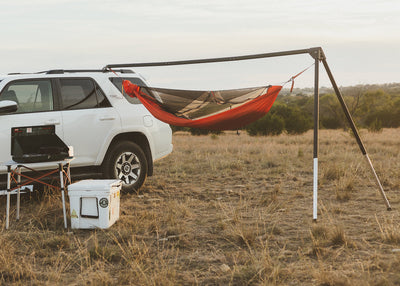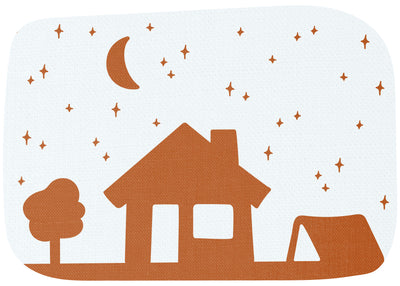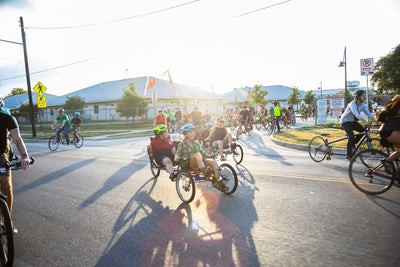Adventure gift guide 2017
Give experiences they'll remember forever with gear that stands the test of time. We're here to make you the most famous gift-giver in your family this holiday–here are a few of our favorite things this season.

Give experiences they'll remember forever with gear that stands the test of time. We're here to make you the most famous gift-giver in your family this holiday–here are a few of our favorite things this season.


The universal mount included with every Outpost is designed to be compatible with a wide variety of roof racks. What's Included: 1 detachable ball bracket 2 clamp plates 2 bolts for ball bracket 2 hex nuts for ball bracket 2 t-slot nuts 4 clamp plate bolts 4 hex nuts for clamp plates 2 foam pads for clamp plates Cross Bar Compatibility The image below shows how the universal mount is assembled for cross bar compatibility. This assembly utilizes all of the included parts except for the 2 t-slot nuts. Outpost is designed to mount to all standard cross bars as seen in the following image: Need more rack space? Outpost is designed to work with the universal mount attached on the underside of cross bars as well: T-Slot Compatibility The next image shows how the universal mount is assembled for t-slot compatibility. This assembly utilizes the detachable ball bracket, 2 bolts, and 2 t-slot nuts. Outpost easily mounts to your rack's t-slots as seen in this image: Additional Mounting Options The universal mount can also attach to these style racks using the two clamp plates: Platform-Style Racks Basket-Style Racks Truck Bed Cargo Racks Custom Mounting Additionally, the Outpost universal mount can be custom mounted to a variety of racks using the detachable ball bracket as seen below: Questions? For more information on how Outpost can attach to your vehicle, please reach out to us here.

Gooey, toasty, crunchy goodness, no one can resist a s'more. This year for National Camp at Home Day, we turned to the marshmallow experts at SmashMallow to share their favorite recipes to level up your s'mores game. Give these recipes a try when you camp at home on March 27th. It may not be summer just yet, but that doesn’t mean it can’t be s’more season! It’s actually ALWAYS s’more season in the SmashMallow office! We have complied our 3 favorite s’more recipes to share with you so that you can join us on the #snackapade – time to get s’moring! Dark Chocolate S’mores Dip See the original recipe. Ingredients 1 Cup semi-sweet chocolate chips 4.5oz. SMASHMALLOW (any flavor or combo you’d like!) Graham crackers Directions Preheat oven to 350 degrees. Place chocolate chips in the bottom of a small to medium cast iron skillet Top the chocolate chips with as many SmashMallows as you can fit! Mallows will puff up and brown, so some chocolate poking through is OK. Put the skillet in the oven and bake for 7-9 minutes, or until the SmashMallows turn golden brown. Serve immediately with graham crackers for dipping! Dark Chocolate S'mores Bars See the original recipe by @amandalee_lifestyle Ingredients Base Layer 2 cups oat flour1/3 cup tahini ¼ cup maple syrup 1 tsp vanilla extract Pinch of sea salt Chocolate Layer ¾ cup dairy free chocolate chips 2 tbsp creamy almond butter Topping 4.5 oz. bag of SmashMallow (any flavor you love!) Directions Preheat oven to 350 degrees and great or spray 9’’x9’’ pan Mix all ingredients for base, then press into a greased pan. Bake for 14 minutes While base is cooking, cut SmashMallows in half. Then melt chocolate carefully in the microwave by heating for 30 second at a time and stirring in between until fully melted. Stir in almond butter Remove base from oven and switch from bake to broil. Pour chocolate mixture over the base, ensuring complete coverage Top the chocolate layer with the halved SmashMallows. Broil for 2-3 minutes or until SmashMallows are golden brown Allow to cool for a few minutes, then cut and enjoy! Traditional S’more Ingredients 4.5 oz. bag of SmashMallow Graham Crackers Chocolate of Choice Skewers Directions Skewer 1-3 SmashMallows on a metal or water-soaked wood skewer Toast SmashMallows over campfire or stove top until you have achieved your desired toastyness Remove SmashMallows from skewer and place on ½ a graham cracker Top SmashMallow with chocolate and the other ½ of graham cracker Enjoy!

The phrase “home is where the heart is” may be a bit cliché and worn-out, but there’s still something very true about it. Thoughts of home are different for everyone, but often there’s a common thread of somewhere comfortable and easy—the place where your tribe lives. Now swap out “home” for “camp” and you arrive at the spirit of National Camp at Home Day. Is it a little cheesy? Maybe. But can you really have too much cheese? There is definitely something to be said for a beautiful campsite in the backcountry with stunning views or a basecamp in your favorite park as migratory songbirds dance in the trees. But more importantly, the people you share your campsite with make these adventures worthwhile. Camp doesn’t have to be a specific place. With the right group of people, that same adventurous spirit can live anywhere. This year, National Camp at Home Day is all about getting ready for the next big camping trip. That said, if you’re the friend in the group that takes gear prep to the next level (You know who you are. The trip to Joshua Tree isn’t for another two months and you’ve already made the Costco run, uploaded your purchases to Splitwise, and packed and repacked until everything fit in your rucksack just so.) don’t forget to sit back and have a cocktail—you can’t beat Moscow mules and hot toddies around the campfire. To the laid back crew, the ones that stuff everything in a bag day-of and spend the trip in mismatched socks: Make sure your planners have fun and remember to pitch in when it’s time to do the dishes. Side note: If you’re not using Splitwise to track group expenses, you may want to check it out the next time your crew goes away for the weekend. Step one: Campsite vibes. If you have access to outdoor space, by all means use it. Fresh city air might not beat fresh mountain air, but with a little imagination your backyard can be a vintage Airstream campsite in Marfa or the perfect hideout along a river in Yellowstone. Just don’t let your imagination get the best of you. Those are squirrels—leave the bear spray inside. Camping in an apartment? Not to worry! Spread your tent out in the living room, “stake out” the rain fly with heavy books weighing down the corners, and stream your favorite virtual campfire. If setting up a tent just sounds boring, grab every blanket in sight and build the ultimate fort. No matter what you choose, do your best to recreate one of your favorite campsites. You can use house plants to bring the outdoor feels close to camp and play your favorite nature sounds from this awesome Spotify playlist (welcome to the jungle). Looking to do some stargazing? You’ll probably want a pack of these. No matter where you set up camp, get out on your favorite trail before the sun goes down and soak up some Vitamin D. Step two: Let’s get cooking. You may be tempted to order your favorite pizza for a night like this (a decision which we fully support), but consider testing out a new camping recipe you’ve been wanting to take on the trail. If you’re outside, work on building the perfect Dutch oven fire for a Basecamp lasagna or even a cobbler for dessert. Indoor camping can be a great time to test out a new Backcountry recipe you’ll be able to enjoy on a future trek into the mountains. One of our favorites is this simple, three-ingredient chili mac recipe: Ingredients: 1 Box of your favorite instant mac (you really can’t beat shells and cheese) 1 can pinto beans (or 1 cup dehydrated beans)/li> 1 package of chili seasoning Directions: Prepare the mac and cheese using the instructions on the box. With the pot on medium/low heat, add in the beans and cook until heated. Stir in the chili seasoning until fully incorporated, and enjoy! (Optional: Throw in some cured sausage you could easily take on a backpacking trip.) Step three: Make it fun. Even if the stars are faint in your backyard, we have the perfect way for you to get more acquainted with the night sky. SkyView is an augmented reality app that allows you to identify constellations simply by pointing your camera in any direction you want to learn more about. Next time you’re under a blanket of stars, you’ll be the expert at camp. Another great learning tool for the outdoors is Merlin Bird ID, an app created by the Cornell Lab of Ornithology. If you have any interest in learning about the wildlife in your neck of the woods, this birding app is a great way to get started. Just select and download your region, input the size and colors of a bird you spotted, and then search through a list of potential matches until you find your bird. Each bird profile comes with a snapshot of info, multiple photos, and a recording of the sounds they make for better identification. Now when you hear that familiar chirping in the woods, you’ll know exactly what you’re listening to. If playing games around the campfire is more your speed, maybe Fish Bowl is right for your group. For rules on how to play, check out this clever website. It even has virtual scoring and cards so no paper is necessary—win for Mother Nature! Now that we’ve mentioned campfires, maybe it’s time to discuss this quintessential part of National Camp at Home Day. If you’re in your backyard with access to a firepit, good on you. Fire up a roaring blaze (safely, of course) and slow roast your perfect mallow. Don’t get discouraged, living room campers—you just have to get a bit more creative. Try arranging throw pillows into a make-shit fire ring and use a lantern to set the mood. No matter what your campfire is made of, let this be the gathering place for eating meals, playing games, sharing stories of past adventures, and hopefully planning future ones as well. Invite friends to camp at home from afar and connect your campfires through the trendy new website you may have heard of called Zoom. Mouth still watering over the possibility of s’mores? Turn the oven on broil and roast your graham cracker, chocolate, and marshmallows in the oven until everything is nice and gooey. Pro tip: Leave the s’more sandwich open to brown your marshmallow, then stack the remaining graham cracker on top before eating. Who said you need a campfire for the perfect s’more? More than anything, we hope National Camp at Home Day inspires you to get outside with the people you love. We encourage you to use this time to prepare for the next trip. Check the bug net for holes, make sure your straps are in good shape, and by all means start laying out an itinerary for your next national park exploration. But most importantly, take in the moments. High on a mountain or under a ceiling fan, in person with friends or chatting on FaceTime from afar—the time is now for making memories you’ll always hold onto. So plan, definitely. Just do your best when the time comes to let go and allow the spirit of adventure take hold.

Meet Briana Cohen, an active rider in our monthly Taco Tri community events and a winner of the Greg Siple Award that helps young adults get in the saddle and out on the road by providing the skills and the gear needed for a lifetime of bicycle travel adventure. As a recipient of the award, Briana organized an outreach project, Fearless Tandem, an introductory workshop to bicycle travel for the students at the Texas School for the Blind and Visually Impaired. When Briana asked our team if we would get involved with her Adventure Cycling project, we couldn't have been more thrilled to raise our hands up. Briana has been an outstanding community leader, a positive spirit, and an absolute joy to bike alongside. We sat down with Briana after organizing this massive project to get her take on what #timeoutside means to her, what the students walked away with from this experience, and tips to get yourself started into the world of Adventure Cycling. There are many forms of cycling and it goes by many names. What exactly is Bicycle Traveling or Adventure Cycling? “Bicycle travel is traveling by bike as a form of adventure and exploration. The adventure begins when you start pedaling, and you are able to openly experience the land and environment in an intimate way. The bike is a mechanism to get you where you want to go - whether to a local or state park, scenic view, quaint town, or to remote places that are not easily accessible. The bike gets you there and there are no limits to where you can go. Bike travel is not much different from cycling, since you are still experiencing the joys and exercise of riding, but there are added layers of exploration, freedom, self-discovery, and fun depending on your adventure.” Biking has been a large part of your life. You started biking as a young kiddo for fun and now it's your form of transportation to commute to work and venture on self-contained rides in the Pacific Northwest. How has that molded your experience for the outdoors and what does time outside mean to you? “I value the outdoors because there’s space for everyone and endless natural beauty. When I spend time outside, I enjoy the fresh air and feel at ease, whether I’m on my own or with lovely people. Biking allows me to reach farther distances than I can’t otherwise, while still being outside.” “So many favorite moments outdoors on the bike. The first time I rode with the Lend Your Legs ride with Texas School for the Blind: it was my birthday and I rode alongside a girl who is blind on the back of a tandem who was completely overjoyed as we went down a hill. She threw her hands up and shouted as if she were going down a roller coaster. She could not see where she was going, but she could experience the thrill. The burst of excitement she felt from biking has always stuck with me.” Why did you apply for the Greg Siple Award? “What led me to apply goes back to last summer when I did a workshop with VieCycle to learn about basic bike maintenance and the art of bike touring. One woman who led the class said anyone can do a bike tour and the bike you already have is good enough; so after the class I went on my first bike camping trip. I did not have any gear for camping and before that weekend, I never imagined I could ride 75 miles in a single day. I borrowed a tent and panniers the night before from someone on Team Snacks and set out for Palmetto State Park. I learned a lot about myself and abilities, and gained newfound freedom knowing I can ride anywhere, anytime.” “The trip was awesome and transformed my perspective; I applied for the award because I wanted more people to have that moment of discovery. I thought back to the blind rider going downhill on the tandem, and immediately knew what my project would be. My reasons for applying to The Greg Siple Award were to 1) feed my love of biking and traveling, 2) inspire others to ride, and 3) spread bike access and awareness.” The Fearless Tandem workshop and community ride was a great success! What did the students learn from the workshop? “Students learned about tandem bikes basics, cycling resources, parks and trail conservation, and the principles of Leave No Trace. They shared their favorite memories spending time outside and also heard stories from a blind athlete and partner who discussed linking up with sighted guides to explore, stay in shape, and race tandems with Paracycling. They got to take home hammocks, reusable water bottles, t-shirts, wooden camping spoons, Adventure Cycling memberships, stylish socks, and other giveaways.” “Students walked away with the tools and confidence to go on their next adventure, which was the group bike ride later that day. The workshop served to inspire them; the gear to equip them; and the ride to have fun with the community. The Lend Your Legs ride has the students pair with cyclists on tandem bicycles to ride. Over 70 people joined for the ride! It was so cool to have such a large group come together and you could tell that bike travel is accessible to anyone. Someone even sent me a direct message on Instagram saying he and his partner had a tandem bike we could use - and they brought it so another student could ride. I love when the community supports each other like that.” During the community ride, we stopped at a park to take a break and raffle gear. A student won a Field Blanket. Now that the event is over, any plans for doing something similar or more community events to get more people to spend time outside? “Always! I’m aiming to continue the momentum of the Fearless Tandem project to provide sustainable cycling resources, access, and awareness. I’ve also been instructing some city cycling classes for beginners so they feel more comfortable and confident riding in Austin. After receiving this award, I switched my job to a role in which I lead group rides with a team for anyone to join.” Do you have any suggestions to get riding or involved in the adventure cycling community? Anything else you’d like to share? “Bikes are a revolutionary tool, not just as a means to get places or for recreation, but to open people up to the outdoors and an upbeat community. The best thing I can recommend is to get out there and ride! You don’t need a fancy bike or gear and there are lots of great trails in and around Austin to check out. If you want to do some bike travel throughout the US, check out Adventure Cycling Association, which runs the Greg Siple Award and has maps featuring rural and low-traffic bicycle routes.” “Applications for The Greg Siple Award 2020 will open on November 1st, 2019! Anyone between the ages of 18 to 30 can apply. I definitely would recommend for anyone who is interested in bike travel to apply! Feel free to reach out to me with any questions! My project page can be found here.” If you asked our team what #timeoutside means to them, you’ll receive a slurry of answers. It comes in many shapes and sizes, different experiences, emotions and memories. It molds how we interact with the world and community around us. Briana radiates our Kammok values of community, love, and adventure. We’re proud to support her and everyone in our community who inspire others to spend time outside. Photos provided by the talented Ali Mae.